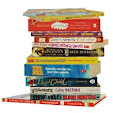I profess to not knowing a lot on publishing. But I do know one thing: publishing is evolving and the traditional method is not the only means now available for releasing a book. These days, it is not uncommon for an author’s book not only to be published in paperback but also as an eBook. Sometimes the eBook comes out first followed by the paperback because the publisher's roots were as an e-publisher and, as they developed the financial means to do so, they capitalized on the traditional market.
With this technology, authors have an additional avenue to reach readers: self publishing. I don’t know whether to be excited about this or not. On the one hand, books will be inexpensive to buy but the quality of the book may suffer. Already we have seen a slew of poorly executed books hit the market. Bad formatting, misspelling, syntax—you name the problem and there is a likelihood there's a published eBook suffers from it. So which method of delivery is the best?
I think every author needs to explore his or her options before sending off a manuscript to a publisher. If they are unpublished, they should avail themselves of alternative venues. There are, for instance, some high-profile writing contests run by established publishing houses seen as vehicles to get work before the eyes of the major players. Even some established authors hold pitch contests so a new author should keep a lookout for these opportunities as well. There is also the Authonomy ( www.authonomy.com) run by Harper Collins, one of many such sites, where unpublished authors can share books and publishers are known to keep tabs on the site always searching for new talent.
Even an established published author doesn’t need to commit to one publisher. We are seeing increasing activity in old books being republished at new homes. Take for example the writer Nora Roberts; some of her most beloved series are being published as eBooks by Berkeley next year. A writer needs to explore his or her options; there are many publishers out there willing to do to business if a writer is established in the field.
Self-publishing levels the publishing field. Money is no longer a consideration to getting a book published and book profits do not need to be shared with a publication house. Smashwords, a fantastic publication tool for these kinds of authors, accepts any book for publication based on their easy criteria and distributes to some of the major players in the eBook market. Friends can help to increase the return on the book as well. However, a codicil: with self-publishing, a writer needs to be scrupulous about the use of a spellchecker combined with the help of friends or betas to weed out the words a simple spellchecker would not catch. A self-published tome need not read unprofessionally.
When choosing an option, a writer needs to choose what is best for them and not be pressured because a publisher is insistent that they know best. Writers must thoroughly research their options before they commit their book to any publisher.
Fashionta






0 comments:
Post a Comment